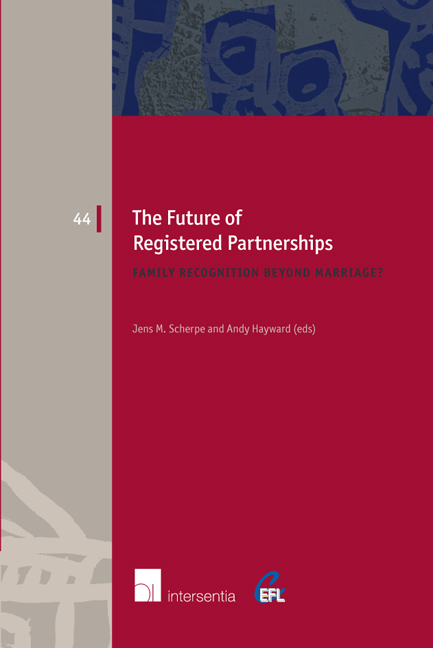Book contents
- Frontmatter
- Foreword
- Preface
- Contents
- List of Contributors
- The Future of Registered Partnerships: An Introduction
- Questionnaire
- Part I Registered Partnerships as a Functional Equivalent to Marriage
- Part II Registered Partnerships as an Alternative to Marriage
- Part III Registered Partnerships in a Time of Transition
- Part IV Alternative Models for Registered Partnerships: Beyond Conjugality, Beyond Formality
- Part V Registered Partnerships, Discrimination and Human Rights
- Part VI Comparative Perspective and Conclusions
- Index
- European Family Law Series
Foreword
Published online by Cambridge University Press: 22 September 2018
- Frontmatter
- Foreword
- Preface
- Contents
- List of Contributors
- The Future of Registered Partnerships: An Introduction
- Questionnaire
- Part I Registered Partnerships as a Functional Equivalent to Marriage
- Part II Registered Partnerships as an Alternative to Marriage
- Part III Registered Partnerships in a Time of Transition
- Part IV Alternative Models for Registered Partnerships: Beyond Conjugality, Beyond Formality
- Part V Registered Partnerships, Discrimination and Human Rights
- Part VI Comparative Perspective and Conclusions
- Index
- European Family Law Series
Summary
In July 2015, I attended a conference in Cambridge – The Future of Registered Partnerships – organised by Jens Scherpe and Andy Hayward, the organisers of the research project on the topic and the editors of this excellent book. We heard from lawyers, academics and law-makers from the UK and from overseas; we heard from jurisdictions where registered partnerships are available for opposite-sex as well as same-sex couples; we heard from other jurisdictions where registered partnerships had been introduced for same-sex couples and then abolished when marriage was opened up for same-sex couples; we also heard from jurisdictions which are ‘in transition’. One of the jurisdictions falling into the last category was and, at the time of writing still is, England and Wales.
In the International Academy of Family Lawyers (IAFL), we have become increasingly interested in a wide range of issues relating to the family – not just divorce and sorting out money and children. International family law specialists have shared their own experiences and the legal developments in their own countries with their colleagues in other parts of the world. The consequences of such dissemination have been immensely valuable for all of us; being able to consider these issues from such a well-informed position makes all the difference. Therefore, we were delighted to support the Cambridge conference, and many of our members attended.
The Cambridge conference in July 2015 posed important questions. Is there a function or a need for another form of formalised relationship besides marriage? What are the global developments in this area, and what can we learn from them? This goes way beyond the question about what should or should not be available to provide equality for same-sex and opposite-sex couples. It begs the question of whether people need something which is not called marriage but which, as in the Netherlands, provides something in legal terms more or less identical to marriage. But what about other relationships, such as carer relationships, that may warrant legal recognition? More locally, should civil partnerships in England and Wales continue to be available but for opposite-sex couples, as well as same-sex couples, or should they be abolished on the basis that it is discriminatory to provide more options for same-sex couples than for opposite-sex couples?
- Type
- Chapter
- Information
- The Future of Registered PartnershipsFamily Recognition Beyond Marriage?, pp. v - viPublisher: IntersentiaPrint publication year: 2017

